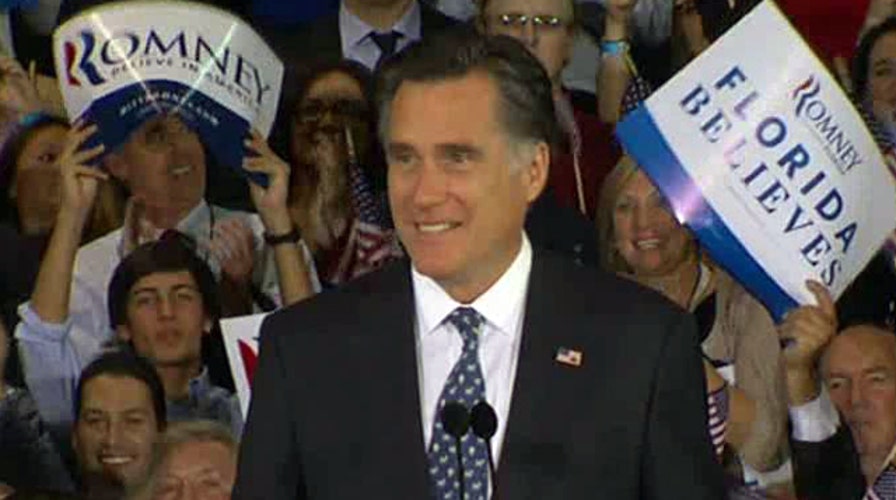Romney: 'Thank you for this great victory'
Former Massachusetts governor thanks supporters, congratulates opponents, blasts Obama's record
Mitt Romney heads into the next phase of the Republican presidential nominating contest carrying a big win under his belt, after reasserting his frontrunner status with a crushing victory over Newt Gingrich in Florida.
However, Romney and the rest of the Republican candidates will have to fine-tune their approach as they enter the bevy of contests scattered all across the country in February, starting in Nevada this Saturday.
There are no historically decisive primaries on the horizon, no big-ticket behemoths that are considered make-or-break for a primary candidate. Instead, the candidates face what could be a drawn-out race for delegates, one that will force the campaigns to make more strategic decisions about where and when to allocate resources.
Gingrich vowed to execute such a campaign at his Florida rally Tuesday night, projecting a six-month battle in what he described as a “two-person race” between him and the “Massachusetts moderate.”
As supporters waved signs emblazoned with the words, "46 States To Go," Gingrich declared he plans to defeat "money power" with "people power" in the coming months, casting his campaign as a counterbalance to the "establishment."
"We are going to contest every place, and we are going to win, and we will be in Tampa as the nominee in August," Gingrich said.
Romney’s victory, in the biggest GOP contest to date, is likely to give the former Massachusetts governor a burst of momentum as he, Gingrich, Rick Santorum and Ron Paul head west to battle in what has become an increasingly negative race.
At his victory speech in Tampa, the site of the Republican National Convention, Romney glided over his opponents and focused his remarks almost exclusively on President Obama.
"I stand ready to lead this party and to lead our nation," Romney said. "My leadership will end the Obama era and begin a new era of American prosperity."
Romney received 46 percent of the Florida vote. Gingrich had 32 percent, followed by Rick Santorum with 13 percent and Ron Paul with 7 percent.
Romney won all 50 of Florida's convention delegates.
With his Florida victory, Romney is the only Republican candidate to have won two primaries. In a historical anomaly, the first three contests went to three different winners.
Romney was initially declared the winner of the leadoff Iowa caucuses, but the Iowa GOP later called the race for Santorum. Romney scored a decisive victory in New Hampshire, but Gingrich answered back with a come-from-behind win in South Carolina.
Gingrich has held a narrow lead in most recent national polls. But the results Tuesday mark a serious setback for the former House speaker, who was leading Romney in Florida polls as recently as last week.
Gingrich, after dominating the debates in the run up to South Carolina, was more subdued on stage ahead of Florida, while Romney aggressively challenged Gingrich's attacks on his personal wealth and his immigration position. Both campaigns, and the groups that support them, were on air with scorching attack ads in the Sunshine State.
Santorum decried the tone of the campaign Tuesday night, urging the party to focus on the "real issue, which is defeating Barack Obama."
"Republicans can do better," Santorum said. "Really, this campaign went downhill. ... the American public does not want to see two or three candidates get into a mud-wrestling match where everybody walks away dirty."
Santorum said that will not help the GOP in November.
Romney, though, said a "competitive primary" will prepare, not divide, the Republican Party. He went on to slam the Obama administration for its record on job creation, foreign policy and other issues. "Mr. President -- you were elected to lead, you chose to follow, and now it's time for you to get out of the way," Romney said.
Gingrich, too, focused part of his remarks on Obama and his own plans for reversing steps the Obama administration has taken. Gingrich said if elected, he would abolish all White House czars by executive order on his first day, as well as authorize the Canada-to-Texas Keystone pipeline which the Obama administration so far has held up.
Santorum and Paul kept a positive outlook, with neither candidate showing an inclination to bow out. Both candidates had largely ignored Florida, letting Romney and Gingrich duke it out while they pressed ahead in other states.
"I think you're going to see conservatives start to coalesce around us," Santorum told Fox News. "If you don't like the state of the race today, just wait until next week."
Paul told an enthusiastic crowd in Nevada that he's winning the "hearts and minds" of voters. "We've only gotten started," he said.
Florida's primary is the most valuable so far in pure numbers. With the awarding of Florida's 50 delegates, Romney will have 87 delegates nationally, compared with 26 for Gingrich. Santorum will remain at 14 delegates and Paul stands with four. It takes 1,144 delegates to clinch the Republican nomination.
In a positive sign for Gingrich, exit polls showed evangelical voters trending for the former House speaker. The exit polls showed Gingrich with 40 percent among that group, and Romney with 36 percent.
But the margin was wider for Romney among seniors and Hispanics. Half of the seniors polled were supporting Romney, while 35 percent backed Gingrich. Romney also led Gingrich 56-29 percent among Hispanic voters, the largest minority in the state, exit polling showed.
Voters overwhelmingly went for Romney among those who said winning in November is the most important quality in a Republican nominee. But for voters who valued "true conservative" credentials as their top quality, Gingrich led with 46 percent, followed by Santorum at 26 percent and Paul at 16 percent. Among those voters, Romney was last with 11 percent.













































